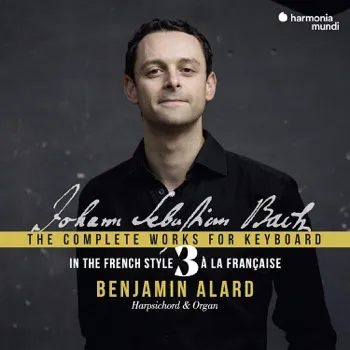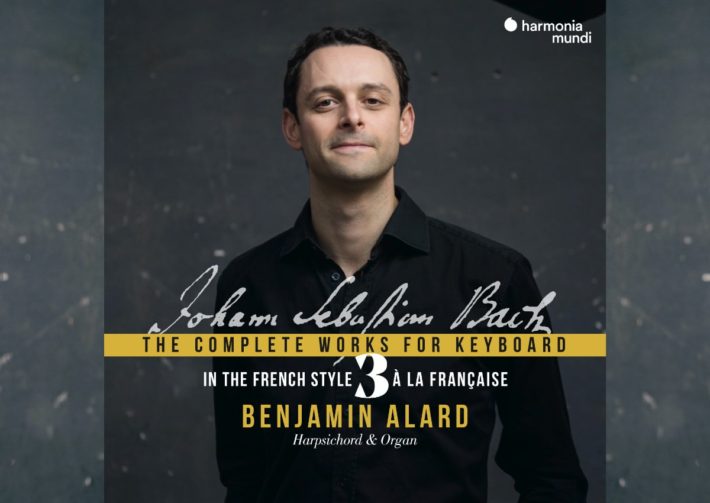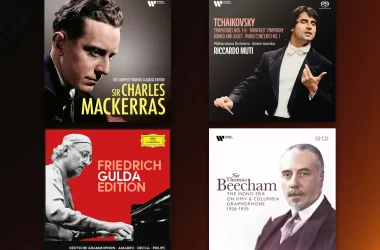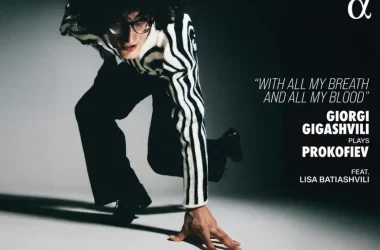This is the third release of a projected 17-volume series containing Bach’s complete keyboard output. Its most audacious aspect is that all the music will be performed by just one artist on either a Harpsichord or an organ – Benjamin Alard. The first two releases in the series (released in April 2018 and 2019) concentrated on early works, and the newest volume focuses on music written during Bach’s time at the Weimar court (1708-1717).

Often referred to as the beginning of his “early maturity,” his compositions from the Weimar years reveal a growing mastery of polyphonic texture and the use of bold and expressive harmonies, in writing that readily flaunts technical prowess. At Weimar, Bach had access to the Prince’s library of music from various European countries, and he clearly savored the opportunity to study this repertoire, which he then sought to integrate into his own compositional style. Alard’s chosen program shrewdly reveals the strong influence of French music in Bach’s compositions. He makes that connection even more clear by including several works by French composers: Couperin, Grigny and Raison.
That influence is immediately apparent in the first track, movement 1 of the Overture in F Major (BWV 820), filled with the dotted-rhythms and ornamentations that surely reflect Couperin’s works. How fascinating to compare this work, as well as the Suites in F Minor and E-flat Major (BWV 823 and 819) with the performances of English Suites Nos. 1, 2 and 4. In the earlier suites we hear Bach experimenting, trying out new compositional ideas, layering in the embellishments and dance rhythms of French music. One can still imagine these pieces being danced to. But when juxtaposed with the English Suites, one distinctly hears those influences fully assimilated into Bach’s own voice, a near perfect merging of Germanic polyphonic procedures and complex structures with French decorative melismatic filigree and dancing rhythms.
The programming wisely breaks up the harpsichord performances on discs 1 and 3, with CD 2, which features performances on the historical organ built by Andreas Silbermann, 1710, located in the Abbaye Saint-Étienne, Marmoutier, France. It is fascinating to hear Bach’s ‘Germanic” organ works played on an instrument that speaks with such of a “French accent”, bright mixtures and powerful reeds. Alard’s registrations are always convincing: in chorale preludes, he ensures, through timbre and articulation, that the cantus firmus is clearly heard. Sample the four settings of “Allein Gott in der Höh sei Ehr” (CD 2, Trs. 7-10) to hear the variety of color he draws from the instrument.
More impressive still is his performance of Bach’s masterful Passacaglia in C Minor (BWV 582). The last performance I heard was Oliver Latry’s reading on his “Bach to the future” CD, released last year just a few months before the tragic fire at Notre Dame, Paris and reviewed here. Latry, using the full resources of that instrument, makes the Passacaglia a symphonic spectacular. Yet despite having a much smaller tonal range at his disposal, Alard creates an equally enthralling performance, with subtle variances in timbre and a masterful management of the accumulating power of each variation, creating a climax before the emotionally impactful fugue (CD 2: Tr. 15, 6’45”).
Indeed, that is a strength of Alard’s playing throughout this 3-disc set. The harpsichord and organ can sound mechanical and even unmusical in lesser hands. But that is never the case here: Alard allows himself moments of freedom in melismatic passages that make them sound improvisatory. In slow movements, his subtle hesitations highlight particularly beautiful harmonies and create a sense of rhapsodic emotion. And Bach’s many polyphonic textures are executed with exceptional clarity of voicing, the result of careful attention to articulation and the shaping of each voice.
This is an impressive artistry that receives an equally impressive recording and production values. The liner notes include a fascinating interview with Alard and interesting notes by Bach scholar Peter Wollny. Given the excellence of this album, we must hope that the series reaches its completion; it will undoubtedly be one of the most important recording projects of this century.
Bach – Complete Keyboard Works, Vol. 3 – “In the French Style”
Benjamin Alard – harpsichord, Organ
Harmonia Mundi, CD HMM 902457.59




















